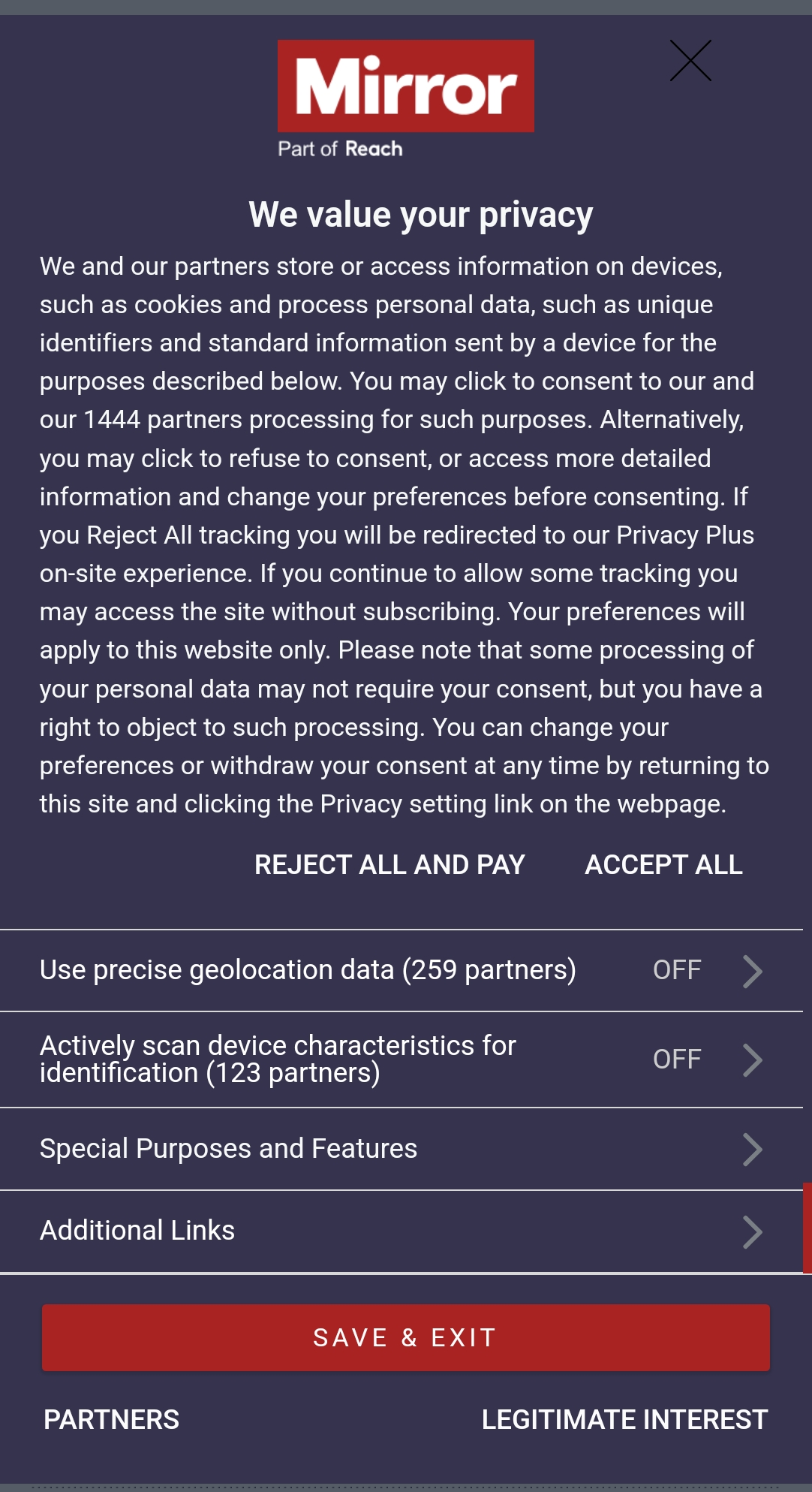
Not sure how long this has been a thing but I was surprised to see that you cannot view the content without either agreeing to all or paying to reject.
Is this
🦋 💁♂️Peak enshittification?
They can always go shittier. Nothing will stop them until the entire human population is strapped into a matrix style ad network, 24/7… paid for by you, renting your neurons as compute for AI to generate more ads and supporting analytics for yourself… until your profitability quotient falls below average and they liquify your corpse to feed a more profitable gen of the attention crop.
Like in that Black Mirror episode when it was checking if you’re watching the ad and you could only pay to skip it.
If I was a human smoothie would you guys drink me?
Lmao even if you pay, you still see ads, they just won’t track you. What an insane monetization scheme
Actually they still track you, they just don’t share the information with advertisers. This is hte “pay or ok” model of blackmailing users to accept cookies and tracking. More or less what Facebook did last year, but Facebook charged a price tag that was higher than what Netflix costs! In the EU, this is not what was intended, and is currently being redefined
https://www.edpb.europa.eu/news/news/2024/edpb-consent-or-pay-models-should-offer-real-choice_en
Absolutely wild that they’re still allowed to call this “consent”
If we imagine the idea of sexual consent being given in the same circumstances, it sounds a lot like a fucking crime.
“Either you consent to having sex with me right now or you pay me a subscription fee in order to not consent. If you do that, I’ll still fuck you, but I’ll use protection”
I like this analogy; it’s provocative and it made me think about the issue for longer than I would have otherwise.
However, after some thought, I don’t think it aligns perfectly since the user can simply choose not to read the article, so there’s an option where they don’t get fucked.
In the same vein, I think we could make a better analogy to sexting. You meet someone, seem to hit it off, and when the texts and pictures get a little spicy, they hit you with a, “you can pay me now and I will keep all of this in my private spank-bank, otherwise I’m going to share our entire relationship with a group chat I’m in with 1200+ people”
I think this is a bit stronger because it hits on a few notes where the hook-up analogy falls short: sharing of sensitive information, extortion in exchange for gratification, and the potential for an ongoing relationship.
Idk, what do you think?
I see where you’re coming from, but my understanding is that the tracking cookies are already on your machine when the banner is presented, so they’ve already put in the proverbial tip.
Lmfao the proverbial tip. OK you got me there 😂
At least one German outlet has been shown to still track you after paying. Just a bit less. So they use a rubber with a few holes poked in.
the user can simply choose not to read the article, so there’s an option where they don’t get fucked.
We are rapidly nearing a point where you can’t read online news from any major (ergo “widely considered somewhat credible”) source without one of those schemes. So I’d argue that the alternative is to just not get access to online news, and that may be considered too much pressure to still consider consent as voluntary.
Sadly, newspapers are not considered “platforms”. A platform is a site that publishes user generated content, so lemmy or facebook. And not all platforms are large platforms too.
So while this is a good first step, it doesn’t cover all online services.
Well ok, they have no GDPR.
It’s standard practice in France too. This is not forbidden by RGPD.
you Frenchies and your fucked up transposed acronyms
Shut the fuck up or I’ll go OTAN on your ass.
Careful, your 5.56 OTAN bullets might shoot backwards.
A common thing in continental Europe too. NOYB and some EU lawmakers are trying to make these pay-or-ok schemes illegal, but I guess in the UK you will be out of luck regarding that.
I think this type of scheme is illegal under the GDPR, which is in effect in the UK just as it is in the EU.
It’s been a while since I worked with the GDPR, but from memory the wording is such that:
The data holder needs to allow people to opt out of data collection. The subject can request to be forgotten. The data holder explicitly cannot charge for this.
But changes move slow, and The Mirror is probably banking on nobody caring enough to complain, and Trading Standards being too underfunded and swamped with other work to investigate otherwise (which they are). If they’re challenged, they’ll just change tack, go “oops” and are unlikely to hit big fines unless they dig in.
Cookie laws are a horrible mess and always have done - the resulting consent banners are far more intrusive than anyone wanted.
Wouldn’t this be blatantly in conflict with the EU cookie law? Like I’m not from Europe but my understanding was that it needs to be equally easy to accept or reject all cookies. Dark patterns aren’t allowed
Currently it’s a grey area I think
It’s not a grey area, it’s clearly illegal (consent has to be given voluntarily. If you can’t use the site without paying, that’s not voluntary). Agencies so far just decided to look the other way and play dumb. There are lawsuits ongoing.
UK is not EU, so EU law does not apply.
i think this one might, actually. When the EU passes a law like this, each member state passes it into their own national law, and so if these cookies laws were implemented before the UK left the EU they’d likely still be there
It’s more than that. The EU law lets any EU citizen report a company that’s not in compliance. That includes companies not strictly in the EU. It’s why even US companies tend to be in compliance (or something like compliance).
If their product is accessible from within the EU, they have to implement the proper rules. That’s why many of the minor / weird news sites aren’t accessible from the EU anymore without VPN. Which I consider a win for EU citizens.
The GDPR was enacted in 2016 and came into effect in 2018. The UK left the EU in 2020.
But UK laws do, which share a lot of commonality - like the GDPR
Person I’m responding to said this was common in continental Europe







